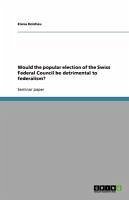Seminar paper from the year 2003 in the subject Politics - Region: Western Europe, grade: 1,3 (A), University of Constance (Faculty for Management Studies), course: Comparative Local Government, language: English, abstract: Switzerland is one of the smallest, oldest and most complex democratic federal states. Local political structure is far more important in Switzerland than in the centralized polities of most modern European countries, given the historically decentralized nature of the Swiss system (see Hass, J.K. 1999: 1067). "Thus the Swiss municipal organisation has proved to be extremely stable in comparison to other countries. They strongly vary in size and the majority are very small. Between 1848 and 1998 the number of municipalities was reduced only from 3204 to 2914 "(see Ladner, A. 1991: 5-6). In this paper, the focus will be on the local government in Switzerland. But before we come to this part, we think it is necessary to give an overall view of Switzerland in general and its political system. Here, we will also introduce the issue of direct democracy in Switzerland, as we think it is a characteristic political element within the Swiss democracy and also plays an important role on the communal and local level. Then we will describe the local level in detail. This will include a short summary about the development of the Swiss communes in history, the role of the communes given by the Swiss constitution, the structure and organization of communes and the responsibilities they have. Finally, we will comment our findings and draw conclusions about the grade of decentralization and what follows from this for the Swiss democracy.
Dieser Download kann aus rechtlichen Gründen nur mit Rechnungsadresse in A, B, BG, CY, CZ, D, DK, EW, E, FIN, F, GR, HR, H, IRL, I, LT, L, LR, M, NL, PL, P, R, S, SLO, SK ausgeliefert werden.









